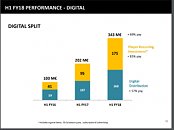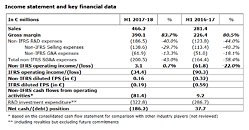Wednesday, November 8th 2017

Ubisoft's Microtransactions Surpass Digital Games Sales in Earnings
Ubisoft has announced on its latest Q2 financials that earnings from microtransactions have exceeded proceeds from digital game sales. Digital revenue increased by a very respectable 69%, but Ubisoft says that Player Recurring Investment (PRI), or the sale of in-game items, DLC, season passes, and subscriptions, increased by a staggering 83% year-over-year, being responsible for €175 million (~$202.6 million) earned during the first two quarters of the year. This amounts to a cool 51% of total digital income, which means that actual digital games sales earned less than DLCs and microtransactions.
Total sales across both Q1 and Q2 came in at €466.2 million (~$539.9 million), up 60% year-over-year, but that's hardly the key point to this story. The key point here is that while a company that heavily focuses on linear, story-driven, single player games has just announced a 25% reduction in its workforce, Ubisoft has just announced tremendous games seemingly on the back of microtransactions and DLC, or, as the company puts it, Player Recurring Investment. We can say what we will regarding the chronicle of an announced death for story-driven single player games, but one fact remains: players love microtransactions, even as there's a universal understanding of loathing towards them.
Sources:
Ubisoft Earnings PDF, via Gamasutra, Ubisoft Earnings Presentation PDF
Total sales across both Q1 and Q2 came in at €466.2 million (~$539.9 million), up 60% year-over-year, but that's hardly the key point to this story. The key point here is that while a company that heavily focuses on linear, story-driven, single player games has just announced a 25% reduction in its workforce, Ubisoft has just announced tremendous games seemingly on the back of microtransactions and DLC, or, as the company puts it, Player Recurring Investment. We can say what we will regarding the chronicle of an announced death for story-driven single player games, but one fact remains: players love microtransactions, even as there's a universal understanding of loathing towards them.




16 Comments on Ubisoft's Microtransactions Surpass Digital Games Sales in Earnings
Also, your profile pic - Preacher? Awesome.
Fact of fiction? I must be weird, I know I am, lol, but I hate them.
A juicy DLC is one thing, and micro-stuff a whole other world...
Ah, and I got both The Division and Ghost Recon for free with two hardware acquisitions and I haven-t spend a penny ingame, not even looked into how that works.
Started with in-game cash, now micro-transactions aplenty. All mechanisms in order to make sure one loses track of how much money is spent in order to get the content. Splendid.
Well, I do vote with my wallet still. :)
I almost hope governments get involved too, just to prevent the gambling type of exposure MT has on kids. This is going continue until game companies get hit. Gamers themselves don't have the sense enough to do it.
They're still going strong & a good number of adults spend their money on premium features/privileges unlike what many believe. Of course it varies from one game to another, but there's very little facts backing certain other assumptions that people associate with microtransactions.
But they can do what they want. So long as they don't drag the whole industry down with them.
As a consumer of DLCs and season passes, I don't even pay the full price for them because I always wait until huge sales of no less than 25% off, but usually found between 50-75% off on Black Fridays.
They never get their intended full price from me when trying to add to the experience of the base game when more often than not is content that should have already been included.
They are only spinning this to justify their practice of micro-transactions.
I'd argue they're exploiting a behavioral pattern, not unlike a gambling addiction.
Edit: Found a case where a free-to-play dev got sued over microtransactions:
cdn.arstechnica.net/wp-content/uploads/2015/10/gameofwarsuit.pdf
The case was dismissed "saying the losses at issue involved virtual, not real money."